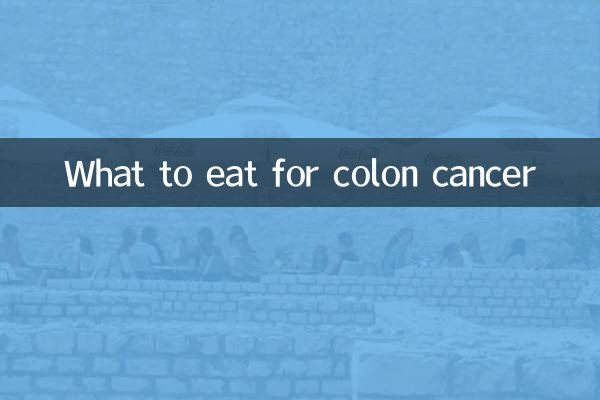What to eat for colon cancer: scientific diet helps recovery and prevention
Colon cancer is one of the common malignant tumors in the world, and its incidence is closely related to diet and living habits. In the past 10 days, the hot topic about the diet of colon cancer patients has continued to attract attention, especially how to assist treatment and prevent recurrence through scientific diet. This article will combine the latest research and hot discussions to provide you with structured data and suggestions.
1. Dietary principles for patients with colon cancer

1.high fiber diet: Promote intestinal peristalsis and reduce the retention time of carcinogens.
2.High quality protein supplement: Repair tissue and maintain immunity.
3.antioxidant foods: Fight free radicals and reduce inflammatory response.
4.Low fat and low sugar: Avoid increased levels of obesity-related hormones.
2. Recommended food list (structured data)
| food category | Specific recommendations | scientific basis |
|---|---|---|
| whole grains | Oats, brown rice, whole wheat bread | Rich in dietary fiber (daily recommendation 25-30g) |
| Vegetables | Broccoli, spinach, carrots | Sulfur compounds and beta-carotene |
| Fruits | blueberries, apples, citrus | polyphenols antioxidant |
| protein | Fish, soy products, chicken breast | Omega-3 fatty acids suppress inflammation |
| fermented food | Yogurt, kimchi (no additives) | Regulate intestinal flora balance |
3. Foods that need to be eaten with caution
| food type | Potential risks | alternative |
|---|---|---|
| processed meat | Nitrite carcinogen | Fresh poultry or soy products |
| refined sugar | Promote cancer cell proliferation | natural fruit supplements |
| BBQ food | polycyclic aromatic hydrocarbons | Steaming/Stewing |
| alcoholic beverages | Damage to intestinal mucosa | Herbal tea |
4. Supplementary recent popular research
1.curcumin: The latest clinical trials show that 100mg daily may inhibit the growth of cancer cells (doctor's guidance required).
2.intermittent fasting: Animal experiments show that the 16:8 diet may enhance the effect of chemotherapy (human trials have not yet been completed).
3.Vitamin D supplement: In 2024, the journal "Cancer Nutrition" pointed out that patients with serum levels >30ng/ml have a better prognosis.
5. Personalized dietary advice
1.postoperative patients: Gradually transition from liquid → semi-liquid → soft food, and avoid flatulent foods such as onions and carbonated drinks.
2.during chemotherapy: Eat small meals frequently (6-8 times/day). If you feel nauseous, try ginger candy or mint tea.
3.targeted therapy: Grapefruit and its products must be absolutely contraindicated (affect drug metabolism).
6. Guidelines for use of nutritional supplements
| supplements | Applicable situations | Things to note |
|---|---|---|
| Probiotics | after antibiotics | Select ≥6 strain preparations |
| protein powder | When not eating enough | Prefer plant protein |
| multivitamins | chronic malnutrition | Avoid excessive supplementation |
Conclusion:The dietary management of colon cancer needs to follow the principles of "individualization, stage-by-stage, and scientific". It is recommended to conduct regular nutritional risk assessment (NRS 2002) and maintain communication with the attending doctor and nutritionist. Recent studies have shown that patients who adhere to the Mediterranean dietary pattern can increase their 5-year survival rate by 18% to 23%. You may wish to refer to this pattern for adjustments in daily life.
(Note: The data in this article are based on the latest briefings from PubMed, the official website of the Chinese Nutrition Society and the ASCO Annual Meeting in June 2024. Please refer to clinical doctor’s advice for specific dietary plans)

check the details

check the details